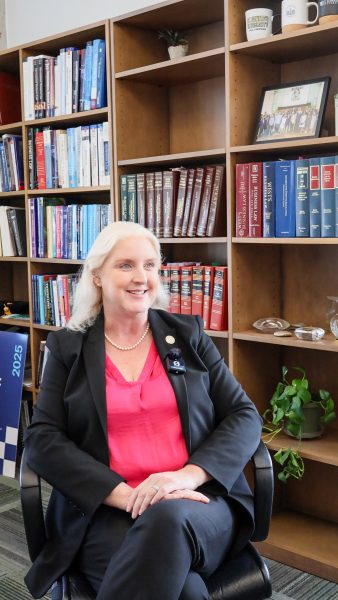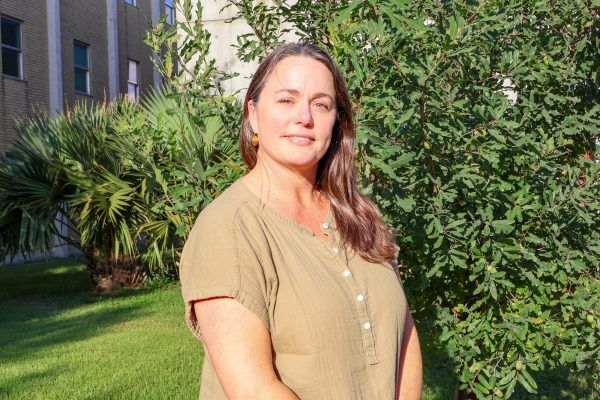Risk management team prepares for potential Ebola threat
Following the recent Ebola outbreak in West Africa and the first two cases of Ebola in the United States in Dallas, the Health and Counseling Center at St. Edward’s University is ready to deal with the potential virus should it pay a visit to our campus.
An on-going risk management team, including Facilities, the Office of International Education, the Communication department, the Dean of Students office, Residence Life, University Police Department and the Health and Counseling Center has developed and reviewed protocol for a potential Ebola threat. This committee is not limited to Ebola risk-management and is designed to bring expertise and provide resources for any potential campus-wide threats.
However, Calvin Kelly, the director of the university’s Health and Counseling Center is asking students not to panic.
“There are no cases reported in Central Texas, and students are more likely to contract the flu,” Kelly said.
The Ebola virus may be contracted through direct contact with bodily fluids of a person who is sick or has died from Ebola, objects contaminated with the virus and infected animals. It is not transmitted through casual contact and only becomes contagious when a person has visible symptoms, which can occur 2-21 days after exposure. If a person exposed to the virus has not developed symptoms after 21 days, they will likely not become sick with Ebola.
The symptoms of Ebola include fever, severe headache, muscle pain, weakness, diarrhea, vomiting, abdominal pain and unexplained bleeding or bruising, according to the Centers for Disease Control and Prevention.
The Health and Counseling Center is prepared to treat any student who presents symptoms. It is fully equipped with triage and is prepared to quarantine any potential cases; the staff are aware of symptoms to look out for. Kelly also regularly consults with Dr. Phil Huang, the medical director for the Austin/ Travis County Health and Human Services Department, and has been keeping up with the protocol outlines the CDC has released.
“We are using our resources, working with the local health department and Dr. Huang. I really feel good; we are as best prepared as we probably can be,” Kelly said.
The Health and Counseling Center is also working with the Office of International Education to educate international students on travel by cautioning them about the greater risks in West African countries, but not policing them or telling international students they can not travel, according to Kelly.
As of Oct. 20, Ebola cases have emerged primarily in West African countries including Guinea, Liberia and Sierra Leone. The total amount of cases in those countries combined is 9,178, with 4,546 reported deaths. Nigeria has seen 23 total cases with nine deaths; Senegal and Spain have each seen one case with no reported deaths; and the U.S. has seen three cases with one death, according to the CDC.
Last Friday, Texas Gov. Rick Perry held a press conference in Austin in which he indicated he supported a travel ban for people in West Africa, where Ebola has been most prominent. This conference was held after a third person in Dallas was diagnosed with Ebola. The first case in Texas and the U.S. was Thomas Eric Duncan, who died as a result on October 8. Two nurses who treated Duncan, Nina Pham and Amber Joy Vinson, have also contracted the virus and are currently being treated in Dallas as the second and third cases in the United States.
A student at the neighboring University of Texas at Austin was confirmed to have been on the same flight from Cleveland to Dallas as Vinson. The student has reportedly self-quarantined his or herself and is voluntarily not participating in campus activities or attending class, a decision which the university supports, according to UT President Bill Powers.
Powers sent out an email to the UT community on the morning of Oct. 17 which read, “I wanted to share this information with you as soon as possible. On Oct. 13, a University of Texas at Austin student flew on Frontier Airlines Flight 1143, on which a healthcare worker who has tested positive for Ebola was also a passenger.”
Powers also added, “The student was not seated in the zone of concern on the plane, is not showing any symptoms, is monitoring body temperature and is in daily contact with health officials, according to recommendations from the Centers for Disease Control and Prevention.”
The Health and Counseling Center’s homepage has been updated as of Oct. 8 to offer background information and guidance, including symptoms, procedures and prevention regarding Ebola.






